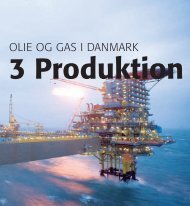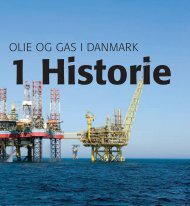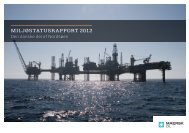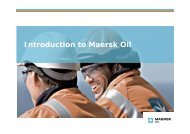Environmental statement - Flyndre and Cawdor - Maersk Oil
Environmental statement - Flyndre and Cawdor - Maersk Oil
Environmental statement - Flyndre and Cawdor - Maersk Oil
You also want an ePaper? Increase the reach of your titles
YUMPU automatically turns print PDFs into web optimized ePapers that Google loves.
<strong>Flyndre</strong> <strong>and</strong> <strong>Cawdor</strong> <strong>Environmental</strong> Statement<br />
Section 1 Introduction<br />
The Offshore Petroleum Activities (<strong>Oil</strong> Pollution Prevention <strong>and</strong> Control) Regulations 2005 (&<br />
Amendments 2011) have been designed to encourage operators to continue to reduce the quantities<br />
of hydrocarbons discharged during the course of offshore operations. The 2011 OPPC Regulations<br />
update the definition of oil, introduce a permitting system for oil discharges <strong>and</strong> strengthen the<br />
powers to inspect <strong>and</strong> investigate oil discharges. The issue of permits under these Regulations is the<br />
mechanism used to implement OSPAR Recommendation 2001/1. In line with OSPAR<br />
Recommendation (2001/1), the UK (DECC) has introduced regulatory requirements to reduce the<br />
permitted average monthly oil discharge concentration to 30 mg/l.<br />
OSPAR Recommendation 2001/1 also requires a 15% reduction in the discharge of oil in produced<br />
water from 2006 measured against a 2000 baseline; controlled by the issue of permits to each<br />
installation. The permits replaced the granting of exemptions under the Prevention of <strong>Oil</strong> Pollution<br />
Act 1971 <strong>and</strong> are issued under the Offshore Petroleum Activities (<strong>Oil</strong> Pollution Prevention <strong>and</strong><br />
Control) Regulations 2005. This target has been met <strong>and</strong> maintained by the industry as a whole.<br />
The Offshore Petroleum Activities (<strong>Oil</strong> Pollution Prevention <strong>and</strong> Control) (Amendment) Regulations<br />
2011 have introduced a number of changes to the Regulations. This includes a new definition of<br />
"offshore installation" which encompasses all pipelines ‐ some of which were not previously covered<br />
by the OPPC Regulations. The amending OPPC Regulations also include the concept of "release" to<br />
cover all unintentional emissions of oil that occur through accidental spills / leaks or non‐operational<br />
discharges. Intentional emissions are now clarified as discharges. However, given that the OPPC<br />
Regulations already covered oil spills <strong>and</strong> leaks, the concept of "release" is being incorporated by the<br />
amending Regulations solely for the purpose of conformity with the Offshore Chemicals<br />
(Amendment) Regulations 2011.<br />
The draft OSPAR Recommendation for produced water discharges (yet to come into force) requires<br />
operators to follow a risk based approach to the management of PW discharge from offshore<br />
installations. The implications of the Recommendation for discharges of PW into the UKCS are not<br />
yet defined, however, in alignment with the Recommendation it is likely that requirements will<br />
comprise undertaking risk characterisation; either on substances based approach or a whole effluent<br />
approach, or a combination of the two.<br />
The Marine <strong>and</strong> Coastal Access Act (MCAA) came into force in November 2009. The Act covers all UK<br />
waters except Scottish internal <strong>and</strong> territorial waters which are covered by the Marine (Scotl<strong>and</strong>) Act<br />
(2010), which mirrors the MCAA powers. Licensing provisions in relation to MCAA came into force on<br />
1 st April 2011. The MCAA will replace <strong>and</strong> merge the requirements of FEPA Part II (environment) <strong>and</strong><br />
the Coastal Protection Act (navigation). The following activities are exempt from the MCAA as they<br />
are regulated under different legislation;<br />
activities associated with exploration or production / storage operations that are authorised<br />
under the Petroleum Act<br />
additional activities authorised solely under the DECC environmental regime, for example,<br />
chemical <strong>and</strong> oil discharges.<br />
Therefore, activities which are not regulated by the Petroleum Act or under the DECC environmental<br />
regime, <strong>and</strong> decommissioning operations require an MCAA licence since April 2011.<br />
<strong>Oil</strong> Pollution Emergency Plans (OPEPs) are required under the Merchant Shipping (<strong>Oil</strong> Pollution in<br />
Preparedness, Response <strong>and</strong> Co‐operation Convention) Regulations 1998. The regulations require the<br />
arrangements for responding to incidents which cause or may cause marine pollution by oil to be in<br />
place <strong>and</strong> the consequence of incidents to be assessed including the potential environmental <strong>and</strong><br />
socio‐economic impacts.<br />
D/4114/2011 1 ‐ 5








